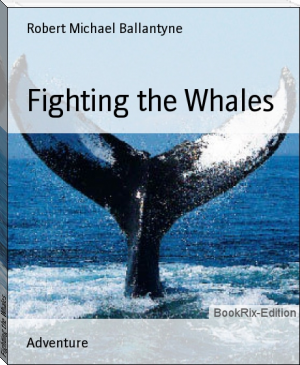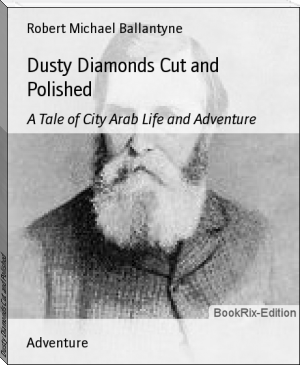The Wild Man of the West - Robert Michael Ballantyne (korean ebook reader .txt) 📗

- Author: Robert Michael Ballantyne
Book online «The Wild Man of the West - Robert Michael Ballantyne (korean ebook reader .txt) 📗». Author Robert Michael Ballantyne
"Does any one know where he lives?" asked Bertram, who was gradually becoming interested in this strange being.
"No. We have sometimes tried to track him, but at a certain place we have invariably lost all traces of him."
"But what is his face like, and how does he dress?" inquired March eagerly; "you have not yet said anything about that."
McLeod was about to reply, when he was interrupted by a loud shouting in the yard of the fort. Leaping from their seats, the whole party ran to the windows.
"I thought so," cried McLeod, seizing his cap and hurrying out. "These are six of my men who have been out after the buffalo, and I see they have been successful."
The fort gate had been swung open, and, just as the guests issued from the reception hall, six hunters galloped into the square with all the reckless noise and dash peculiar to that class of men. Leaping from their foaming steeds, they were quickly surrounded by their comrades, and by the women and children of the place, who congratulated them on their success in the chase, and plied them with eager questions.
That they had indeed been successful was evident from the masses of fresh meat with which the horses were laden.
"Well done, Davis," said McLeod, stepping up to one of the men, who, from his age and intelligence, had been put in command of the hunting party. "You are back sooner than I anticipated. Surely, your good genius sent the buffalo across your path."
"We have bin in luck, sir," replied the hunter, touching his cap. "We've killed more than we could carry, an', what's worse, we've killed more than we wanted."
"How so?"
"We've had a brush wi' the redskins, sir, an' we had to kill one or two in self-defence."
McLeod's brow darkened. He clenched his teeth, and the large veins swelled in his neck and forehead. With a powerful effort he repressed his anger, and said--
"Did I not warn you to avoid that if you could?"
"True, sir," replied Davis humbly; "but we could not help it, for, in the first heat of passion, one o' them was shot, an' after that, of course, we had to fight to save our own scalps."
"Who fired that first shot?" inquired McLeod sternly.
Davis made no reply, but all eyes were at once turned upon a tall slouching man, with a forbidding cast of countenance, who had hitherto kept in the background.
"So, so, Larocque," said McLeod, stepping up to the man, "you've been at your bloody work again, you scoundrel. Hah! you not only bring the enmity of the whole Indian race down on your own worthless head, and on the heads of your innocent companions, but you have the effrontery to bring the evidence of your guilt into this fort along with you."
As McLeod spoke, he laid hold of a scalp which still dropped fresh blood as it hung at the hunter's saddle-bow.
"If I'm to answer to you for every scalp I choose to lift in self-defence, the sooner I quit you the better," answered Larocque sulkily.
"Was there any occasion to lift this scalp at all?" demanded McLeod, as he seized the man by the collar.
"Who talks of lifting scalps?" growled a loud, deep-toned voice.
All eyes were instantly turned on the speaker, and the crowd fell back to permit Mr Macgregor, the person in command of the Mountain Fort, to approach the scene of action.
The man who now appeared on the scene was a sad and a terrible sight to behold. He was one of that wretched class of human beings who, having run a long course of unbridled wickedness, become total wrecks in body and mind long before the prime of manhood has been passed. Macgregor had been a confirmed drunkard for many years. He had long lost all power of self-control, and had now reached that last fearful stage when occasional fits of _delirium tremens_ rendered him more like a wild beast than a man. Being a large and powerful man, and naturally passionate, he was at these times a terror to all who came near him. He had been many years in charge of the fur-trading establishment, and having on many occasions maltreated the Indians, he was hated by them most cordially.
One of his mad fits had been on him for some days before the arrival of March Marston and his friends. He had recovered sufficiently to be able to stagger out of his room just at the time the buffalo hunters, as above described, entered the square of the fort. As he strode forward, with nothing on but his shirt and trousers, his eyes bloodshot, his hair matted and dishevelled, and his countenance haggard in the extreme, he was the most pitiable, and, at the same time, most terrible specimen of human degradation that the mind of man could conceive of.
"What now! who has been lifting scalps?" he growled between his set teeth, striding up to Larocque, and glaring in his face, with his bloodshot eyes, like a tiger.
McLeod held up the bloody scalp.
"Who did it?" roared Macgregor.
"I did," said Larocque with an attempt at a defiant air.
The words had barely passed his lips when he received a blow between the eyes that felled him to the earth. He attempted to rise, but, with a yell that sounded more like the war-cry of a savage than the wrathful shout of a civilised man, Macgregor knocked him down again, and, springing at his throat, began to strangle him.
Up to this point, McLeod refrained from interfering, for he was not sorry to see the murderer receive such severe punishment; but, having no desire to witness a second murder, he now seized his master, and, with the assistance of two of the men, succeeded in tearing him off from Larocque, and in conveying him, as respectfully as possible in the circumstances, to his private chamber.
CHAPTER TWELVE.
AN ARGUMENT ON ARGUMENTATION--ALSO ON RELIGION--BOUNCE "FEELOSOPHICAL" AGAIN--A RACE CUT SHORT BY A BULLET--FLIGHT AND PURSUIT OF THE REDSKINS.
When McLeod returned to the square, he found that the trappers had adjourned with the men of the establishment to enjoy a social pipe together, and that Theodore Bertram was taking a solitary, meditative promenade in front of the gate of the fort.
"You seem in a pensive mood, Mr Bertram," said the fur trader on coming up, "will you not try the soothing effects of a pipe? Our tobacco is good; I can recommend it."
He offered a plug of tobacco to the artist as he spoke.
"Thank you, I do not smoke," said Bertram, declining the proffered luxury. "Tobacco may be good--though I know it not from experience. Yet, methinks, the man is wiser who does not create an unnatural taste, than he who does so for the purpose of gratifying it."
"Ah! you are a philosopher."
"If judging of things and questions simply on their own merit, and with the single object of ascertaining what is truth in regard to them, constitutes a philosopher, I am."
"Don't you find that men who philosophise in that way are usually deemed an obstinate generation by their fellow-men?" inquired the trader, smiling as he puffed a voluminous cloud from his lips.
"I do," replied Bertram.
"And don't you think the charge is just?" continued the other in a jocular tone.
"I do not," replied the artist. "I think those who call them obstinate are often much more truly deserving of the epithet. Philosophers, in the popular sense of the word, are men who not only acquire knowledge and make themselves acquainted with the opinions of others, but who make independent use of acquired knowledge, and thus originate new ideas and frequently arrive at new conclusions. They thus often come to differ from the rest of mankind on many points, and, having good reasons for this difference of opinion, they are ever ready to explain and expound their opinions and to prove their correctness, or to receive proof of their incorrectness, if that can be given--hence they are called argumentative. Being unwilling to give up what appears to them to be truth, unless it can be shown to be falsehood, their opinions are not easily overturned--hence they are called obstinate. Thinking out a subject in a calm, dispassionate, logical manner, from its first proposition to its legitimate conclusion, is laborious to all. A very large class of men and women have no patience for such a process of investigation--hence argumentation, that most noble of all mental exercises, is deemed a nuisance. Certainly argumentation with unphilosophical persons _is_ a nuisance; but I know of few earthly enjoyments more gratifying than an argument with a true philosopher."
"That's wot I says, so I do, out-an'-out," observed Bounce, who had come up unperceived, and had overheard the greater part of the above remarks. "Jist wot I thinks myself, Mr Bertram, only I couldn't 'xactly put it in the same way, d'ye see? That's wot I calls out-an'-out feelosophy."
"Glad to hear you're such a wise fellow," said McLeod patronisingly. "So you agree, of course, with Mr Bertram in condemning the use of the pipe."
"Condemn the pipe?" said Bounce, pulling out his own special favourite and beginning to fill it--"wot, condemn smokin'? No, by no means wotsomdiver. That's quite another kee-westion, wot we hain't bin a disputin' about. I only heer'd Mr Bertram a-talkin' about obst'nitness an' argementation."
"Well, in regard to that," said Bertram, "I firmly believe that men and women are all alike equally obstinate."
"Ha!" ejaculated Bounce, with that tone of mingled uncertainty and profound consideration which indicates an unwillingness to commit oneself in reference to a new and startling proposition.
"On what grounds do you think so?" asked McLeod.
"Why on the simple ground that a man _cannot_ change any opinion until he is convinced that it is wrong, and that he inevitably must, and actually does, change his opinion on the instant that he is so convinced; and that in virtue, not of his will, but of the constitution of his mind. Some men's minds are of such a nature--they take such a limited and weak grasp of things--that they cannot be easily convinced. Others are so powerful that they readily seize upon truth when it is presented to them; but in either case, the instant the point of conviction is reached the mind is changed. Pride may indeed prevent the admission of this change, but it takes place, as I have said, inevitably."
At this Bounce opened his eyes to their utmost possible width and said solemnly, "Wot! do ye mean for to tell me, then, that thair ain't no sich thing as obstinacy?" He accompanied this question with a shake of the head that implied that if Bertram were to argue till doomsday he would never convince him (Bounce) of that.
"By no means," returned the artist, smiling; "there is plenty of it, but obstinacy does not consist in the simple act of holding one's opinion firmly."
"Wot _does_ it consist of,





Comments (0)